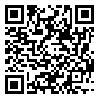Volume 8, Issue 2 (Spring 2020)
PCP 2020, 8(2): 133-142 |
Back to browse issues page
1- Student Research Committee, Iran University of Medical Science, Tehran, Iran.
2- Department of Clinical Psychology, School of Behavioral Sciences and Mental Health (Tehran Institute of Psychiatry), Iran University of Medical Science, Tehran, Iran.
3- Department of Clinical Psychology, Faculty of Psychology and Education, Kharazmi University, Tehran, Iran.
2- Department of Clinical Psychology, School of Behavioral Sciences and Mental Health (Tehran Institute of Psychiatry), Iran University of Medical Science, Tehran, Iran.
3- Department of Clinical Psychology, Faculty of Psychology and Education, Kharazmi University, Tehran, Iran.
Abstract: (3391 Views)
Objective: The present study aimed to predict borderline personality traits in adolescents based on parenting styles and emotion regulation strategies.
Methods: This research was a cross-sectional study. The statistical population included all female high school students in Sanandaj City, Iran in the academic year 2016-17. Out of them, a total of 261 students were selected as the study sample using a random multistage cluster sampling method. The following instruments were used to gather the study data: the schizotypal trait questionnaire-B, the emotion regulation questionnaire, and the parenting styles inventory. The study data were analyzed using multiple regression analysis and the Pearson correlation coefficient.
Results: According to the findings, authoritarian and authoritative parenting styles significantly predicted borderline personality total score and its components (P<0.01). But, in this model, permissive parenting was not a significant predictor (P>0.01). In addition, the results indicated that both emotion regulation strategies of reappraisal and suppression significantly predicted borderline personality total score and its components (P<0.05).
Conclusion: According to the study results, parenting styles and emotion regulation strategies could be regarded as important variables in predicting borderline personality symptoms, and they should be targeted in therapeutic interventions to reduce borderline personality symptoms.
Methods: This research was a cross-sectional study. The statistical population included all female high school students in Sanandaj City, Iran in the academic year 2016-17. Out of them, a total of 261 students were selected as the study sample using a random multistage cluster sampling method. The following instruments were used to gather the study data: the schizotypal trait questionnaire-B, the emotion regulation questionnaire, and the parenting styles inventory. The study data were analyzed using multiple regression analysis and the Pearson correlation coefficient.
Results: According to the findings, authoritarian and authoritative parenting styles significantly predicted borderline personality total score and its components (P<0.01). But, in this model, permissive parenting was not a significant predictor (P>0.01). In addition, the results indicated that both emotion regulation strategies of reappraisal and suppression significantly predicted borderline personality total score and its components (P<0.05).
Conclusion: According to the study results, parenting styles and emotion regulation strategies could be regarded as important variables in predicting borderline personality symptoms, and they should be targeted in therapeutic interventions to reduce borderline personality symptoms.
Keywords: Parenting styles, Emotion regulation strategies, Borderline personality traits, Adolescents
Type of Study: Research |
Subject:
Cognitive behavioral
Received: 2018/12/14 | Accepted: 2020/02/25 | Published: 2020/04/1
Received: 2018/12/14 | Accepted: 2020/02/25 | Published: 2020/04/1
| Rights and permissions | |
 |
This work is licensed under a Creative Commons Attribution-NonCommercial 4.0 International License. |





